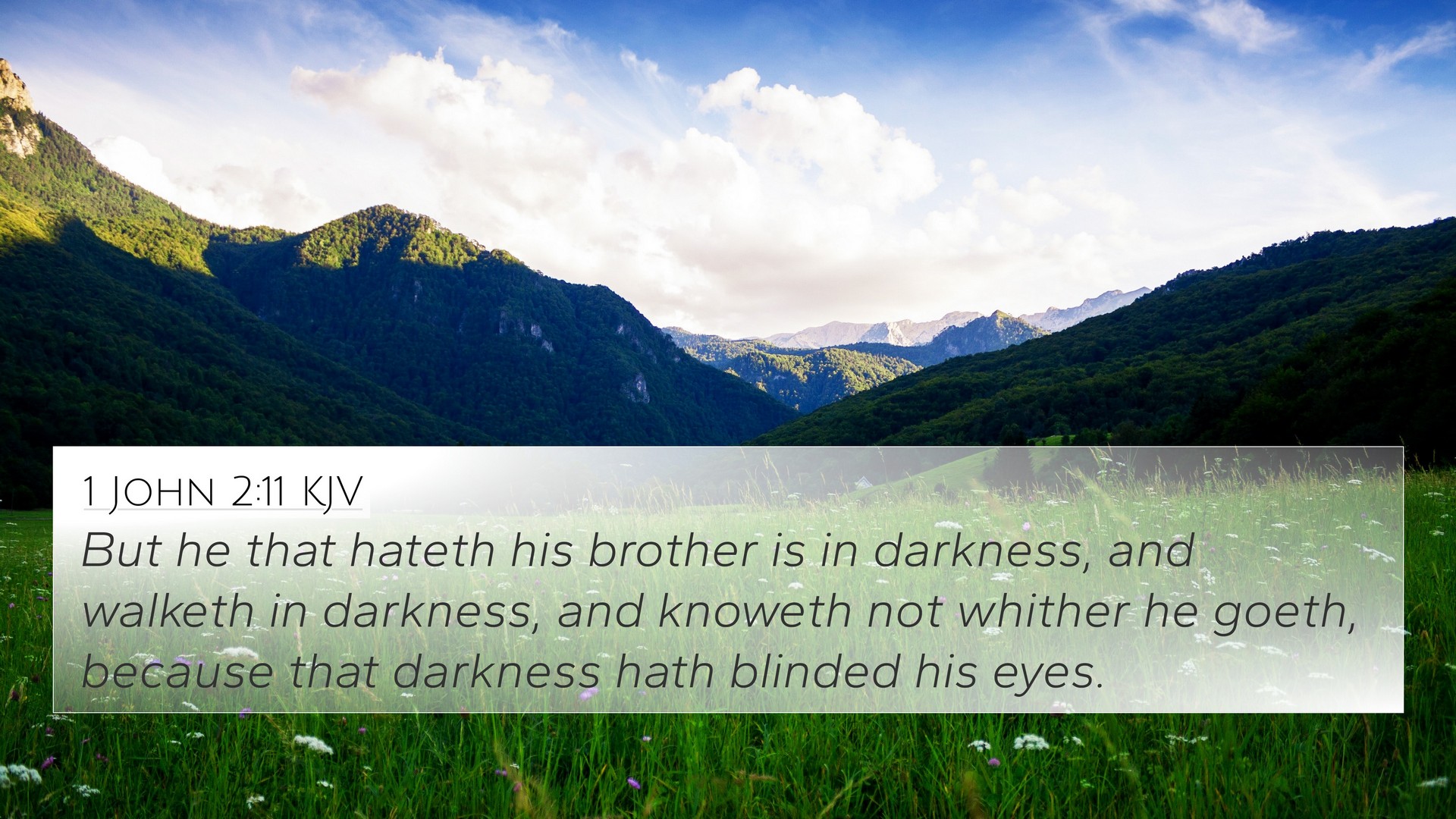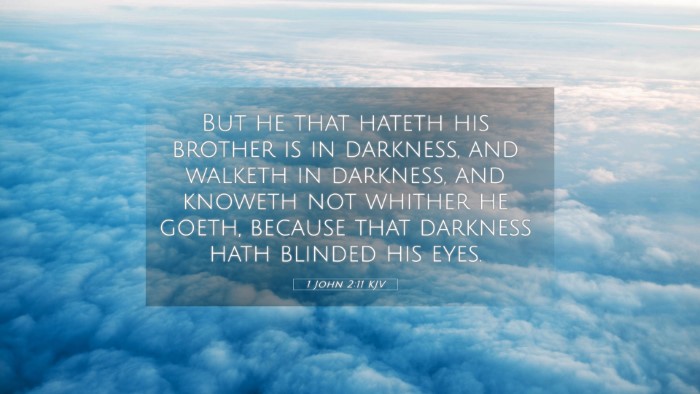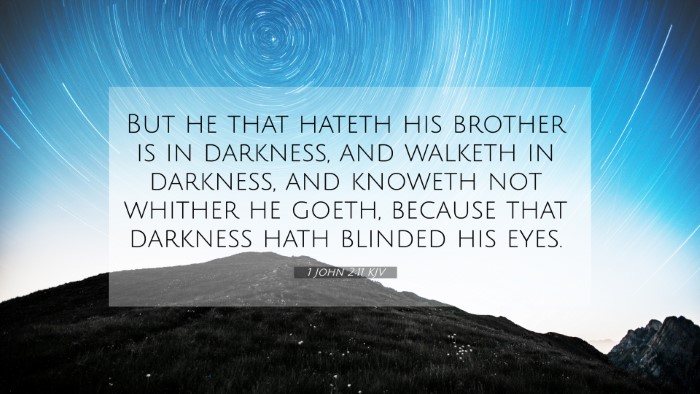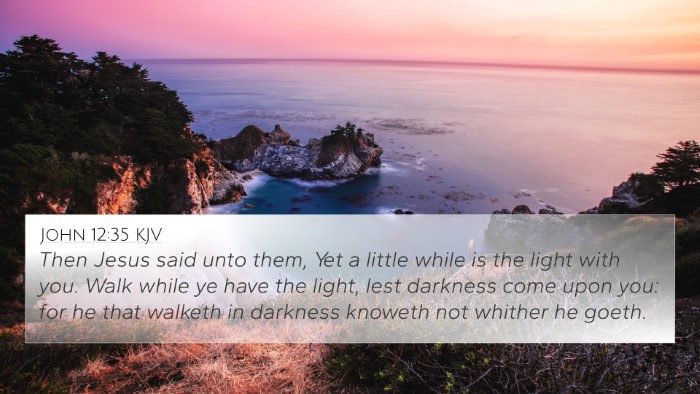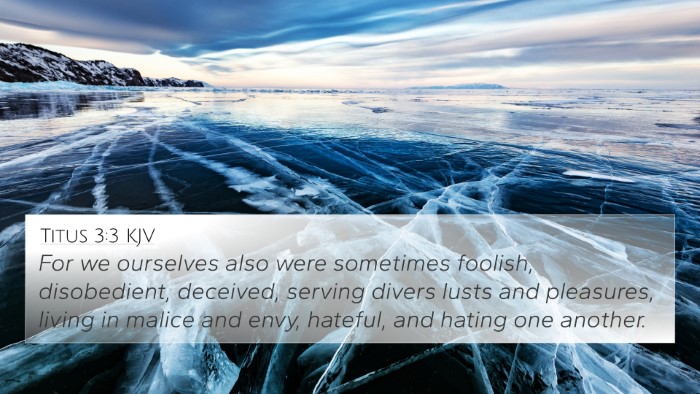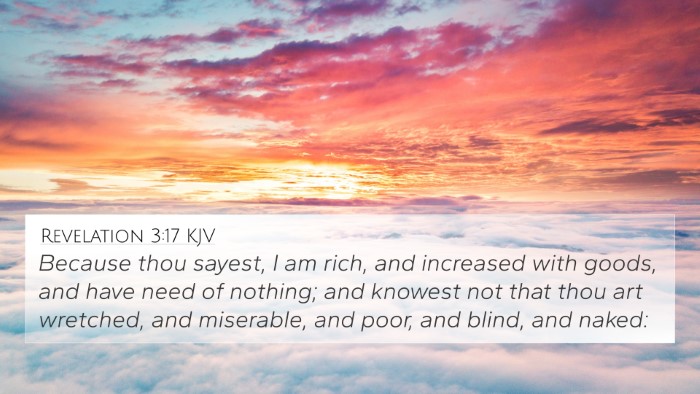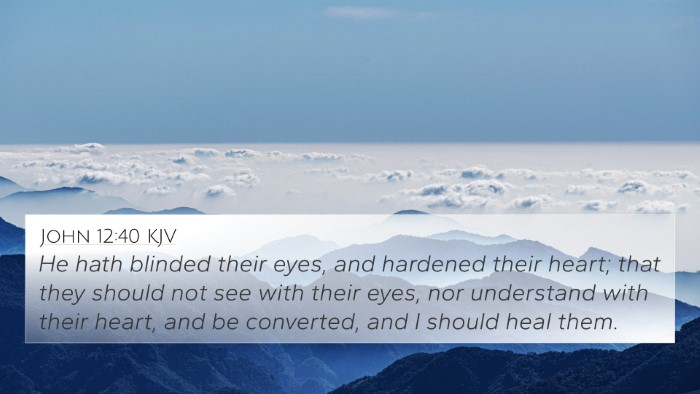Understanding 1 John 2:11
Bible Verse: 1 John 2:11 - "But he that hateth his brother is in darkness, and walketh in darkness, and knoweth not whither he goeth, because that darkness hath blinded his eyes."
This verse from 1 John addresses the serious implications of hatred towards others, particularly within the context of Christian community. It emphasizes the spiritual blindness and moral darkness that accompanies such hatred. Below is a detailed summary of insights derived from public domain commentaries by Matthew Henry, Albert Barnes, and Adam Clarke.
Verse Analysis
Key Themes:
- Spiritual Blindness
- Morality and Ethics in Relationships
- Contrast Between Light and Darkness
1. Spiritual Blindness and Darkness
According to Matthew Henry, this verse illustrates that hatred towards a brother signifies a person living in spiritual darkness. Hatred is not just an emotional state but a condition that affects one’s spiritual perception and understanding. It leads to ignorance concerning one's path and purpose in life.
Albert Barnes elaborates that the term "darkness" symbolizes moral and spiritual depravity. A person who harbors hatred is cut off from the light of God’s truth, resulting in an impaired ability to discern the right path. This blindness can lead to the destruction of relationships and a distancing from God.
2. The Importance of Love in Christian Life
Here, Adam Clarke points out that love is fundamental in the Christian life, and its absence is equivalent to living in darkness. The context of brotherly love is crucial; to be a follower of Christ is to embody love, and hatred negates that identity. The assertion that “light” is associated with love highlights that true enlightenment directs believers toward love for one another.
3. Ethical Implications and Moral Responsibility
Henry stresses that the ethical implications of this verse extend beyond personal feelings. It is a reminder that one's inner state can affect the community. Hatred not only jeopardizes one's relationship with God but also the health of the community of believers.
4. Inter-Biblical Dialogue and Connections
Connections between this verse and other scriptures highlight the enduring message of love and the dangers of hatred:
- Matthew 5:22: "But I say unto you, That whosoever is angry with his brother without a cause shall be in danger of the judgment..." - This verse links to John’s emphasis on the inner disposition toward others.
- 1 John 3:15: "Whosoever hateth his brother is a murderer..." - An explicit reference connecting hatred to significant moral consequences.
- John 13:34-35: "A new commandment I give unto you, That ye love one another; as I have loved you..." - The call to love stands in stark contrast to hatred.
- Romans 13:10: "Love worketh no ill to his neighbour: therefore love is the fulfilling of the law." - This emphasizes love as the foundation of Christian ethics.
- Ephesians 5:8: "For ye were sometimes darkness, but now are ye light in the Lord: walk as children of light." - This draws a line between the state of being in darkness versus being in light.
- Galatians 5:22-23: "But the fruit of the Spirit is love, joy, peace, longsuffering, gentleness, goodness, faith..." - Evidence of bearing fruit in the light, contrasting the works of hatred.
- 1 Peter 2:9: "But ye are a chosen generation, a royal priesthood, an holy nation, a peculiar people..." - A reminder of the identity believers carry and their call to reflect God’s light.
Practical Applications
When exploring the applications of 1 John 2:11 in daily life:
- Self-Examination: Believers should regularly assess their relationships with others, ensuring that love prevails over bitterness and hatred.
- Community Engagement: Actively fostering an environment of love and respect among one another is crucial for spiritual health.
- Promoting Forgiveness: Encouraging a culture of forgiveness instead of allowing animosity to take root is vital in maintaining unity in Christ.
Conclusion
The message of 1 John 2:11 serves as a profound reminder of the dangers of hatred and the importance of love in the life of a believer. Em bracing the light not only enhances personal spiritual growth but also nurtures the collective well-being of the community of faith.
Cross-Referencing Summary: Engaging with cross-references allows for a deeper, comprehensive understanding of biblical principles and teachings. Tools for Bible cross-referencing facilitate discovering connections and analyzing thematic elements across scriptures, enhancing the believer's study of God's Word.
